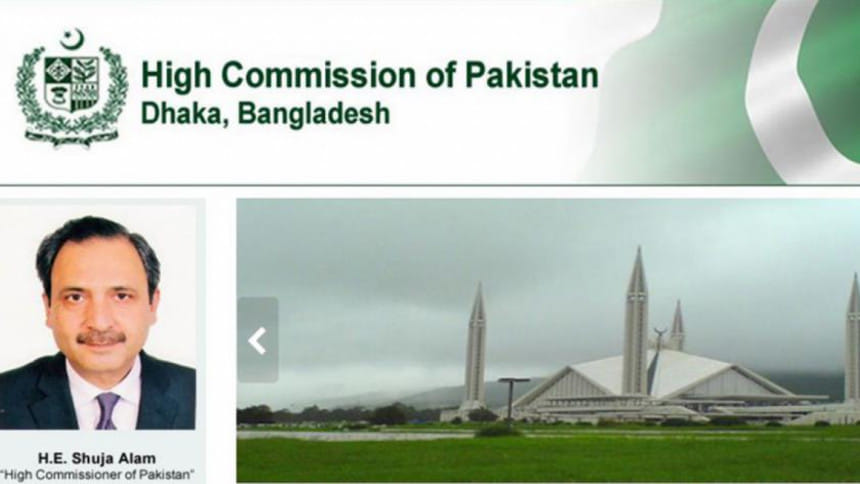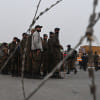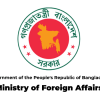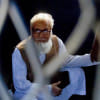Pakistan high commissioner summoned

Amid escalating diplomatic tension between Dhaka and Islamabad, Bangladesh foreign ministry yesterday summoned the Pakistan envoy here and lodged a strong protest, three days after Pakistan expressed concern over dismissal of the review petition against the death sentence of Jamaat chief Motiur Rahman Nizami.
Handing a "strongly worded" protest note to Pakistan High Commissioner Shuja Alam, Dhaka urged Islamabad to act responsibly and refrain from making such uncalled for statements.
Foreign Secretary (Bilateral) Mizanur Rahman summoned the envoy to his office at 3:00pm and conveyed Dhaka's strong protest against Islamabad's concern over Nizami, a convict of crimes against humanity and genocide in 1971.
The note verbale handed over to the envoy stated that by repeatedly taking the side of those Bangladeshi nationals who are convicted of crimes against humanity and genocide, Pakistan has once again acknowledged its direct involvement and complicity in the mass atrocities committed during Bangladesh's Liberation War in 1971.
On Thursday, the Supreme Court dismissed Nizami's petition for reviewing its verdict that upheld his death penalty awarded by the International Crimes Tribunal-1 in 2014.
The next day, the foreign ministry of Pakistan in a statement expressed “deep concern and anguish” over the SC's dismissal of the petition.
Nizami was the president of Jamaat's student wing Islami Chhatra Sangha from 1966 to September 1971 and ex-officio chief of Al-Badr, the notorious militia formed to collaborate with Pakistan occupation force.
The militia unleashed terror on peace-loving Bangalees, killed unarmed civilians, raped women and destroyed properties during the 1971 war.
Sensing Pakistan's imminent defeat towards the end of the war, the Al-Badr systematically rounded up, tortured and killed the nation's brightest luminaries to intellectually cripple the soon-to-be independent Bangladesh.
The Jamaat-e-Islami ameer or his party has never repented of the cold-blooded savagery.
'TOTALLY UNACCEPTABLE'
The protest note said it is a matter of great regret that Pakistan continues to comment in the misguided defence of this convicted criminal.
“These uncalled for reactions amount to direct interference in the internal affairs of a sovereign country, which is totally unacceptable,” it added.
Dhaka reiterated that the verdicts against the convicted individual Nizami had been handed down through an independent, sound, fair, impartial, open and transparent judicial process, and without any political interference.
The trials took solely into consideration the crimes committed by Nizami in 1971 and had nothing to do with his political identity or affiliation, the note stated.
The note refuted Pakistan's labelling the proceedings of the Tribunal as “controversial trials” and affirmed that Pakistan should in no way make biased, flawed and unfounded comments about the independent judiciary of a sovereign country.
According to a press release of the foreign ministry, the high commissioner was reminded that Pakistan continues to present a misleading, limited and partial interpretation of the underlying premise of the Tripartite Agreement of April 1974.
The essential spirit of the agreement was to create an environment of good neighbourliness and peaceful co-existence.
The agreement never implied that the masterminds and perpetrators of war crimes, crimes against humanity and genocide would continue to enjoy impunity and eschew the course of justice.
The note also pointed out that Pakistan has systematically failed in its obligation to bring to justice those of its nationals identified and held responsible for committing mass atrocity in 1971. It was Bangladesh which has consistently advocated regional peace, harmony, reconciliation and integration.
Dhaka deeply regretted that despite Bangladesh's repeated overtures, the malicious campaign by Pakistan against the trials of the crimes against humanity continued and this was an impediment to the bilateral relations.
The high commissioner was asked to take serious note of the points raised by Bangladesh and bring those to the attention of the competent authorities in Pakistan.

 For all latest news, follow The Daily Star's Google News channel.
For all latest news, follow The Daily Star's Google News channel. 








Comments